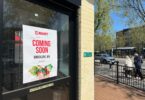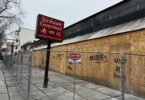BROOKLINE — Margie E. Mendez, 81, arrived at Brookline Town Hall at about 5:30 a.m. on Tuesday morning. Displaying an American flag on her face mask, along with a face shield and a medical boot, she is the first voter in line at Brookline’s Precinct 4 on a historic Election Day.
As part-time workers and town clerk employees scramble to prepare the precinct for the 2020 U.S. presidential election, Mendez sits patiently outside of the lobby. One of the employees gave her a chair so she could wait more comfortably.
When the polls open an hour and a half later, Mendez is the first to cast her vote. She is proud of the fact that history and civics were her best subjects when she was in school, and reminisces on the excitement she felt when she turned 18 and could finally vote.
“I feel great,” she says as she leaves the building, “I’ve been voting for 63 years.”
* * *
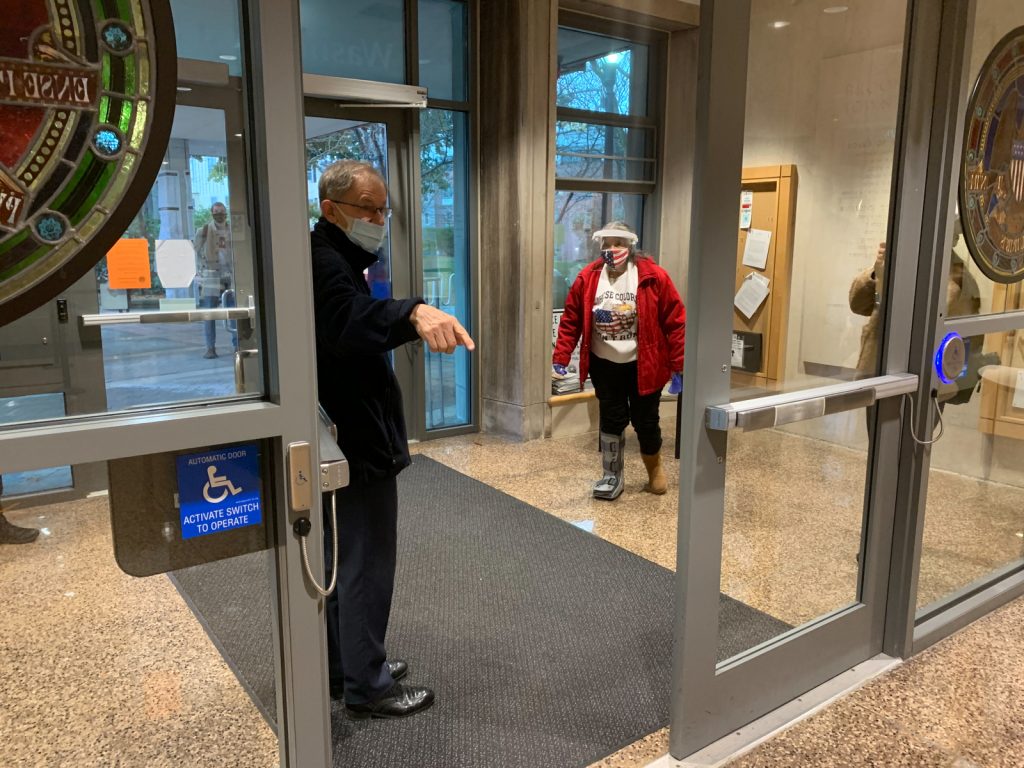
Voters like Mendez see only a fraction of what goes into preparing any given election. However, 2020 presented a unique set of challenges for members of the Brookline Town Clerk’s Office as they worked towards opening the polls on Nov. 3.
In mid-January Brookline’s long serving town clerk, Patrick Ward, had to leave the office on an indefinite medical leave. His absence could not have come at a worse time. In a year with four elections and the emergence of a global pandemic, the town clerk’s office needed help to get through what lay ahead.
That help came in the form of Jeffrey Nutting.
A spry, 65-year-old man, Nutting served as the town administrator for Franklin, Massachusetts for 18 years. He recently retired in Aug. of 2019 following decades of experience in local government.
By April the following year, after receiving a phone call from Brookline’s town administrator, he was tasked with helping the Brookline Town Clerk’s Office for the next seven months while navigating three elections in the midst of COVID-19.
* * *
While Mendez patiently waits outside the lobby, Nutting bounces from room to room accomplishing all sorts of miscellaneous tasks. He grabs extra boxes of gloves and places them on the precinct’s check-in table before rushing to grab an extra box of pens.
After seven months of build-up, Nutting has finally reached the presidential election.
He goes back and forth from the lobby to the voting area, and pops in and out of the Town Clerk’s Office. He discusses some further logistics with Chris Tisbert, the administrative assistant to the town clerk, next to the office whiteboard.
“Election Day is Here,” has taken the place of a daily countdown which has been there for weeks.
In the other room, poll workers for Precinct 4 are preparing for a long day ahead. As precinct officials go over a list of dos and don’ts for the coming hours, workers respond with questions concerning red check marks and tally sheets.
Jim Slayton, the town election warden for Precinct 4, still has to test the AutoMARK voting machine at the rear of the room.
“This is what makes the election legal,” he says while referring to the machine.
While the majority of voters are able to mark their ballots with a pen and paper, the voting machine is there to ensure that those with disabilities are still able to vote.
Slayton sits at the machine and feeds it a sample ballot. He opts to write in the name of the precinct clerk for president before clicking through the rest of the ballot. A pair of headphones are plugged into the machine, but lay untouched. The nifty, twenty-year-old machine can also read out people’s ballots.
Slayton finishes up his mock ballot only to find that the machine is not working.
“Alert! A problem has occurred. Please notify an election official,” appears in red across the screen.
The polls have yet to open and Precinct 4 has already hit a snag.
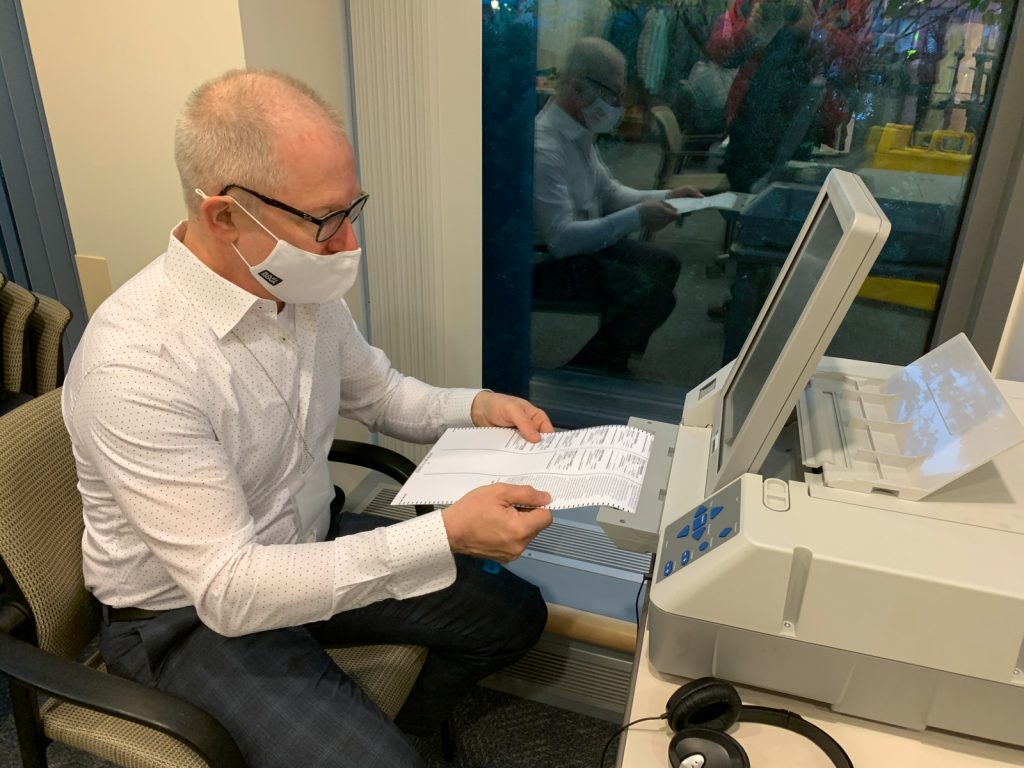
Back in the office, Tisbert and other town clerk employees field calls from the various precincts across town.
Precinct 2, located at the Coolidge Corner Library, wants more plexiglass for their PPE table. There is no more plexiglass to give.
The state-provided cell phone at Precinct 11, located inside the Driscoll School’s gym, doesn’t work and poll workers don’t have the right charger.
One of the workers will have to use their personal cell phone to communicate hourly voting numbers with the Town Clerk’s Office.
Precinct 1, located at a Boston University building at 43 Hawes Street, is missing one of the keys to its ballot box.
A town clerk employee is sent over with a replacement.
Tisbert and the majority of the town clerk’s office staff will be functioning in this capacity for the entire day. As phones ring, and issues pop up, their job will be to help the precincts in the fastest and most efficient manner possible.
As for Nutting, his day will mostly be spent on the ground at the various precincts.
“It’s a complete mishmash of just kind of running around solving little problems,” Nutting said of his job on election day. “It’s mostly errand boy, quite frankly.”
* * *
At 7 a.m. sharp, with rain drizzling over the town of Brookline, the polls officially open. A line of voters forms outside the building, eager to cast their ballots. For about forty minutes there is a steady stream of people waiting in line. Once the initial morning rush is over, however, in-person voting produces a fairly low turnout across the board.
This is undoubtedly due to the prevalence of mail-in voting, and the two weeks of in-person early voting held prior to the election.
The last few days leading up to Election Day saw the Town Clerk’s Office undergo a massive undertaking in the advance removal of all early voting ballots. By 5 p.m. on Sunday, 23,877 ballots were taken out of their envelopes, names checked off, flattened, and prepared to be delivered to their individual precincts on Tuesday to be run through the ballot box with the in-person votes.
The high stress of processing and advance removing all of those ballots took a huge weight off of poll workers, and the Brookline Town Clerk’s Office, come Election Day.
Nutting pulls up to Brookline High School at 7:55 a.m. The rain has stopped, and Brookline citizens stand across the street holding signs for various political candidates.
Out of all the polling locations in town, Brookline High School is the largest. Precincts 6, 7 and 10 are located within the school’s gymnasium. But even with the large venue and three precincts located there, the space has virtually no voters by the time Nutting walks in.
Bethany Bell, a volunteer working the Brookline High School precincts, stands by the gym entrance when Nutting enters. With most volunteers in their 60s, Bell says she feels it is important to volunteer considering the impacts of COVID-19.
“Every election is important,” Bell said. “I feel this election is especially important.”
Bell notes that for the first 50 minutes there was a steady stream of voters. Her warden called it “rush hour.” However, by the time Nutting arrives she says it has cooled down.
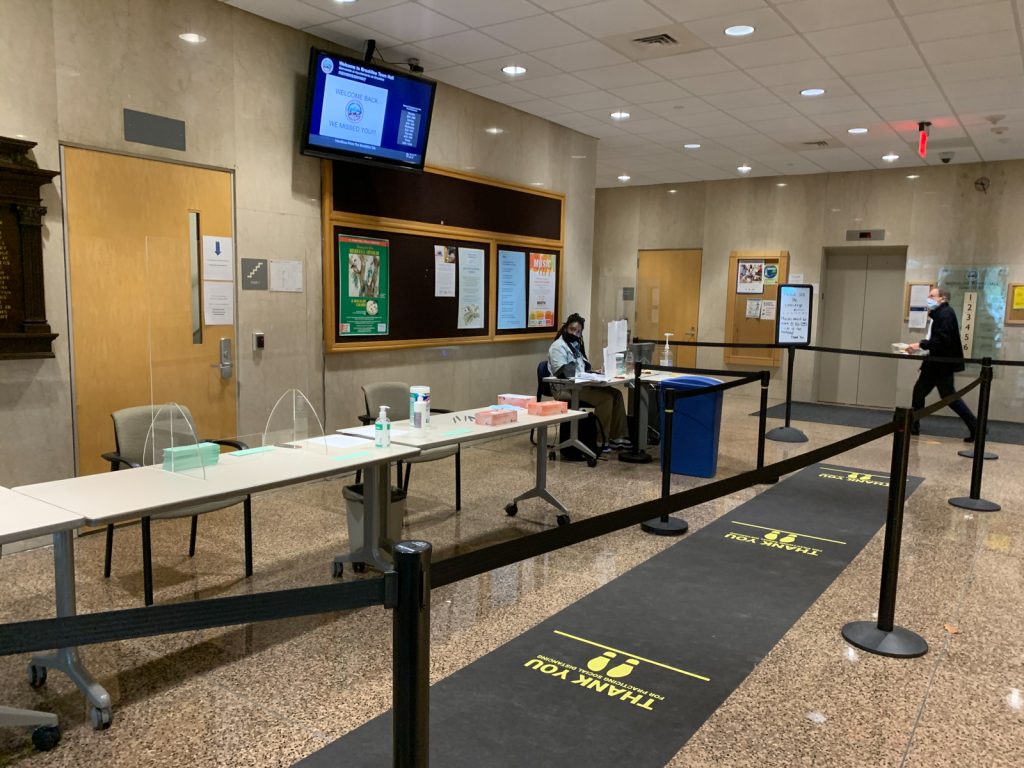
Nutting goes around to each precinct warden and asks if there are any issues. Other than a ballot with the wrong name on its sticker, which is resolved easily by calling Tisbert and confirming that that person had never requested a ballot, everyone is okay.
“Most people just appreciate that you’re checking in,” Nutting said. “And if you can solve a problem for them, fine.”
After checking up on a few more precincts, all of which had low turnouts and not much activity, Nutting makes a stop at Town Hall around 9:30 a.m.
One of his first tasks is to check the outdoor drop box to see if any ballots were left. He puts the handful of ballots into a mail bin and walks back into the lobby. Not even the poll workers who are supposed to be checking in voters are there. Besides the lone concierge, the entire space is empty.
“For this type of election, it’s starting off very well,” Tisbert says when updating Nutting on any activity he missed.
Every hour precincts have been calling in to Town Hall to report their voting numbers. Debby Cohen, a real estate agent who led the advance removal effort throughout the weekend, takes their calls and compiles the numbers for an hourly count.
However, due to precincts processing early voting ballots along with those cast today, the hourly numbers are inflated.
“It would be nice if there was a way to separate it,” Cohen said, “but in the long run it’s about voter turnout.”
Nutting had already been back out visiting more precincts for an hour before arriving at the Coolidge Corner School, where Precincts 3 and 8 are located.
While there, he spoke with the wardens about switching which boxes would be used to transport the ballots back to Town Hall, and called Tisbert to help make the change official for all precincts.
As he begins to leave he makes sure to check in with some of the poll workers at Precinct 8. There, he finds a more unpleasant problem than what has popped up so far.
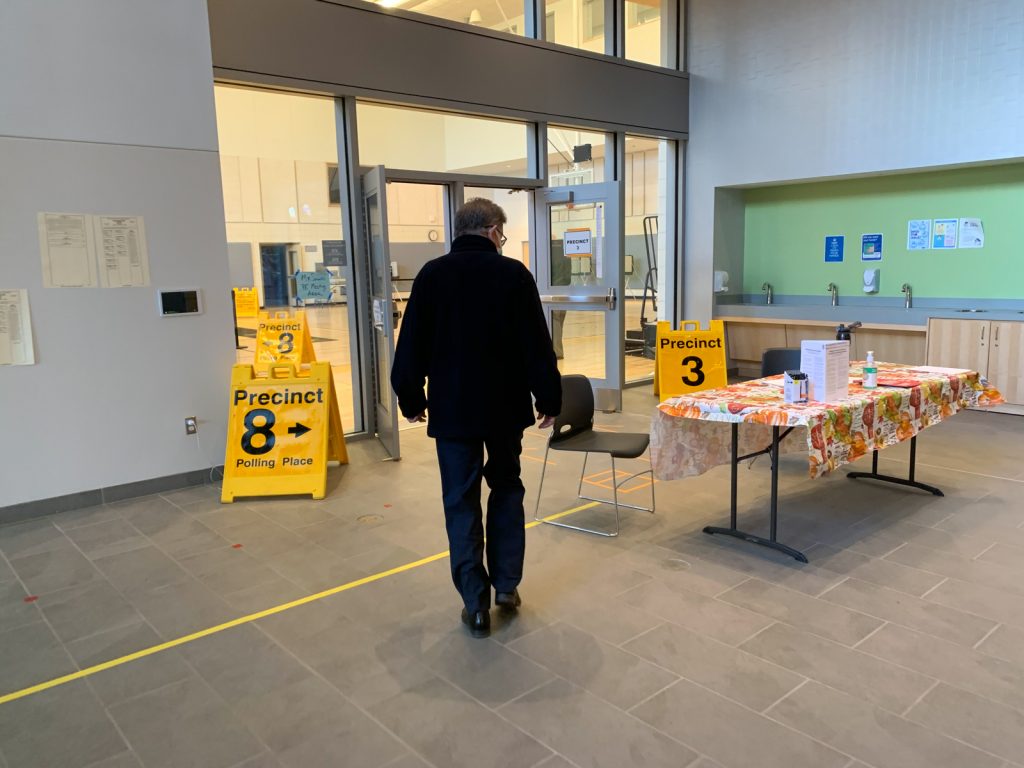
An elderly woman had arrived at Precinct 8 wanting to vote. However, she was registered in Precinct 11.
The woman had moved to a home in Precinct 8, and was under the impression that she could vote here. But the law states one has six months to vote in their old precinct unless they choose to re-register. The poll worker didn’t have the heart to tell the “little old lady,” that she couldn’t vote at Precinct 8, and gave her a ballot to fill out.
Nutting, surprised that they had even given her a ballot, tells the poll worker that she can’t have the woman vote here. The poll worker looks embarrassed, and is hesitant to confront the woman.
The unfortunate task falls onto Nutting.
He walks over to the elderly woman by himself. She has been given a stool to sit on as she fills out her ballot. She looks consumed in thought over who she will be voting for.
In the most diplomatic of tones, Nutting attempts to explain to her that she cannot vote here and must go to Precinct 11 to do so. An awkward silence fills the space immediately around them. She stares blankly at the booth in front of her.
After an uncomfortable pause, she protests. She tells Nutting that she had called Town Hall and that they had said she could vote at Precinct 8.
He gently tries to explain the situation to her, but she continues to stare blankly at the booth.
“Everybody’s giving me the wrong information,” she says.
Nutting tries to defuse the situation. He apologizes, but chalks it up to people making mistakes. “Yeah, but how many people?” she asks sharply.
“We all do,” he replies.
After a continued back and forth Nutting tries to take her ballot. She recoils, asking him what he’s going to do with it. When he tells her it will be destroyed she opts to rip it herself.
Back at Town Hall, Slayton is taking a lunch break. It’s 12:20 p.m. and the line at his precinct has been slow to nonexistent for the past few hours. Suddenly, in the middle of a bite, Nutting appears from the elevator to alert him of a problem downstairs.
The ballot box has stopped working.
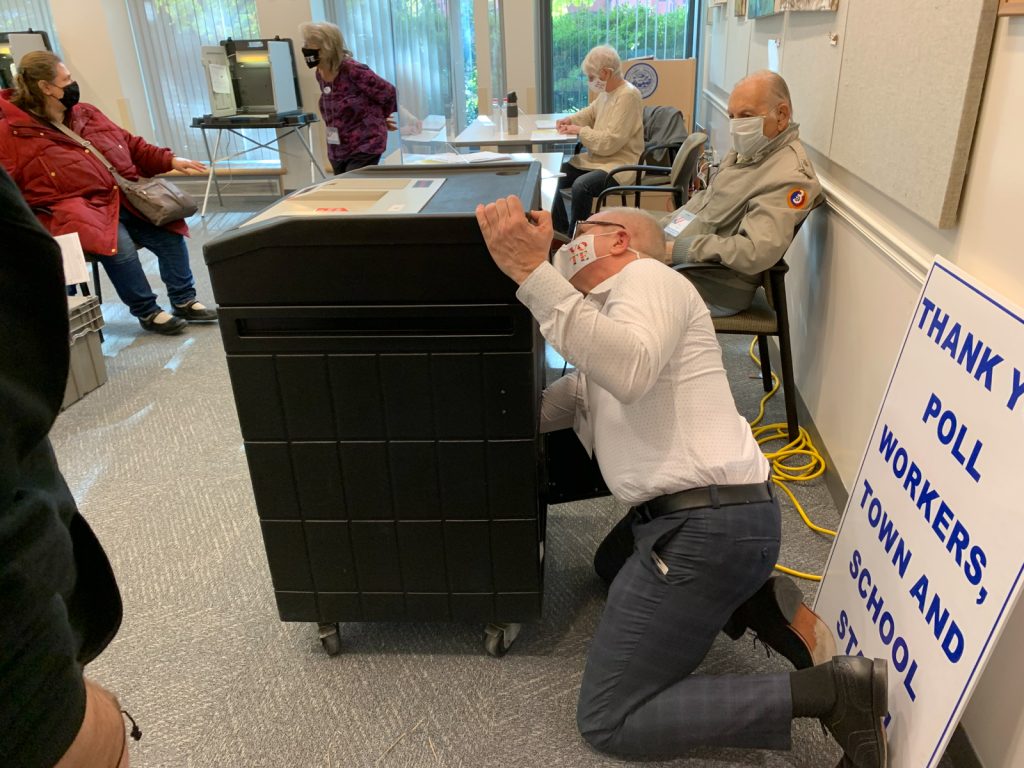
Slayton walks into the voting area to find two voters sitting impatiently in chairs facing the box. The rest of the room, filled with poll workers and Town Clerk’s Office employees, are standing around the box trying to find a way to fix it.
One of the voters mutters aloud, “Should’ve done it by mail…”
The machine has stopped sucking in ballots. A poll worker tries to slide one in to show Slayton the problem. They then step away to give him space with the machine.
Slayton walks around it inquisitively. He kneels down behind it and opens the back to see if any ballots are jammed, but finds none.
“Is it plugged in properly?” asks the voter from before.
It’s a good question. Slayton considers unplugging the machine and then replugging it, but hesitates. He fears it might wipe the ballot count for the entire day.
“I haven’t seen this in 10 years,” Slayton remarks.
When Tisbert walks in the room Slayton asks for his opinion on unplugging the ballot box. He seems fairly confident it won’t reset the count. Slayton decides to go for it.
As he’s unplugging the machine the more talkative voter expresses concern on whether her ballot will be counted. Tisbert, trying to reassure her, tells her if the machine won’t do it then it will just have to be hand counted.
“I’m not comfortable with it,” she says in response.
After waiting 10 seconds Slayton plugs the box back in. The room waits with bated breath to see if the reboot will work.
It does.
“Thank you, Jesus!” exclaims the other voter who had been waiting.
When Slayton runs into Nutting again he excitedly tells him that the ballot box has been fixed, and how all it took was unplugging it and replugging it in.
“That’s 90 percent of life isn’t it?” he replies.
For his last major task of the day, Nutting takes on the responsibility of a runner. Even though all of the in-person early voting ballots had been advance removed and dropped off at the precincts at the start of the day, mail-in ballots and ballots left in the outdoor drop box continue to trickle in.
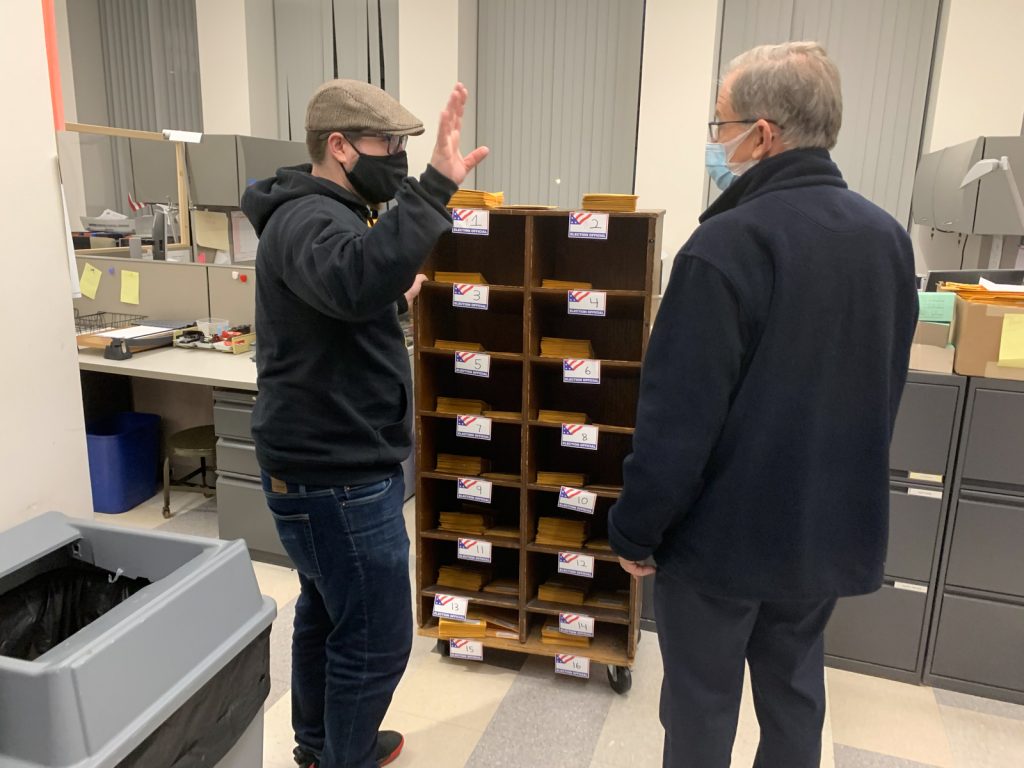
These stragglers have been sorted and placed in a cabinet with marked cubbies. With each cubby marked for an individual precinct, it is now time to hand deliver them to their respective precincts to be counted.
Nutting splits the responsibility with two other groups of runners, and chooses the precincts which he has yet to visit throughout the day. By 2:30 p.m. he is on the road again.
The week prior to the election, Nutting worked for 79 hours. That’s quite a lot for a man who is supposedly retired. Now, there’s only a few hours left in his last election with Brookline.
“This is the most boring election we’ve done here,” he says.
Throughout the day he has repeated the refrain that Election Day has been “anticlimactic.” However, the only reason it has been so slow is due to all of the work he and the entire Brookline Town Clerk’s Office have done in advance.
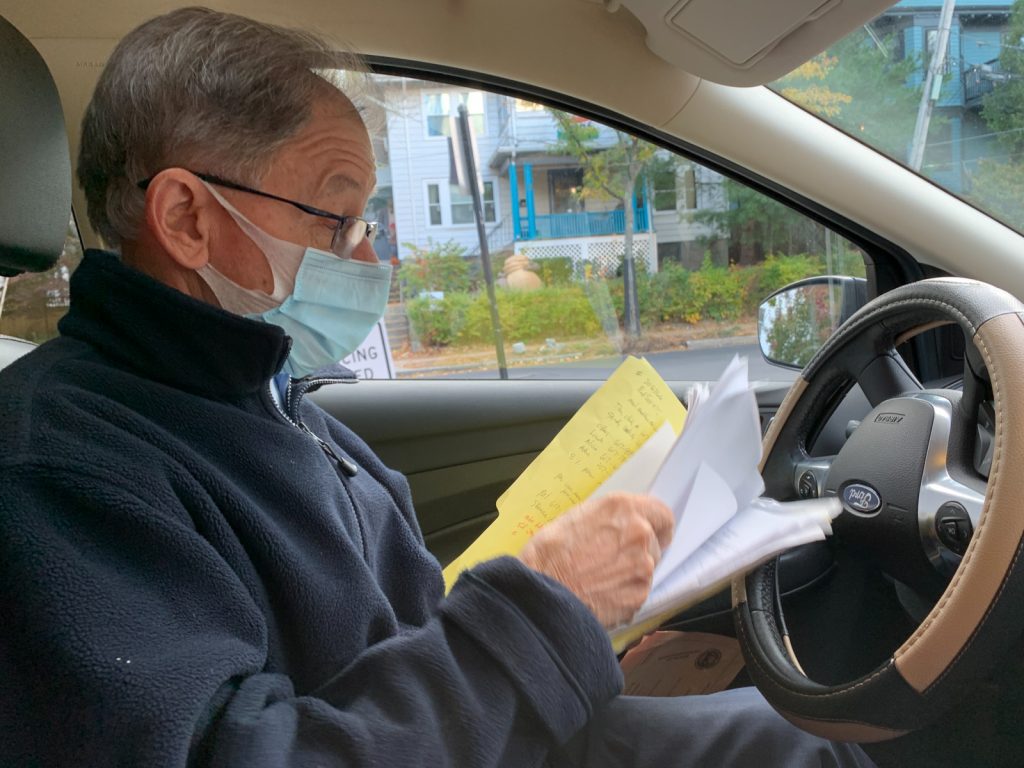
According to Nutting, the Town Clerk’s Office and Brookline voters have both adjusted and gotten better at handling elections during COVID-19. They did their homework, and as a result it has been fairly smooth sailing all day.
He isn’t sure yet when his last day at the Brookline Town Clerk’s Office will be. On Wednesday morning he will have to go to the precincts and pick up the PPE among other reusable equipment. Regardless, by the time he makes his final stops on Election Day his seven months in Brookline are close to done.
“Kind of like more my niche is the interim [positions],” Nutting said. “You make things better and you leave. You know, life goes on.”
In regards to what he will do once he leaves The Brookline Town Clerk’s Office, Nutting says he hopes to find another interim position helping or consulting with local governments.
After Nutting and the other runners deliver their ballots there will be another group of runners that goes out around 6 p.m. All ballots delivered via mail or drop box after 6 p.m., and postmarked on Nov. 3, will still be a part of the official count. However, they won’t be counted until the following Monday.
The remainder of the day proves to be slow once Nutting returns to Town Hall. The most stressful thing to come from the next few hours are a couple of precincts missing their hourly call to give updated voter counts.
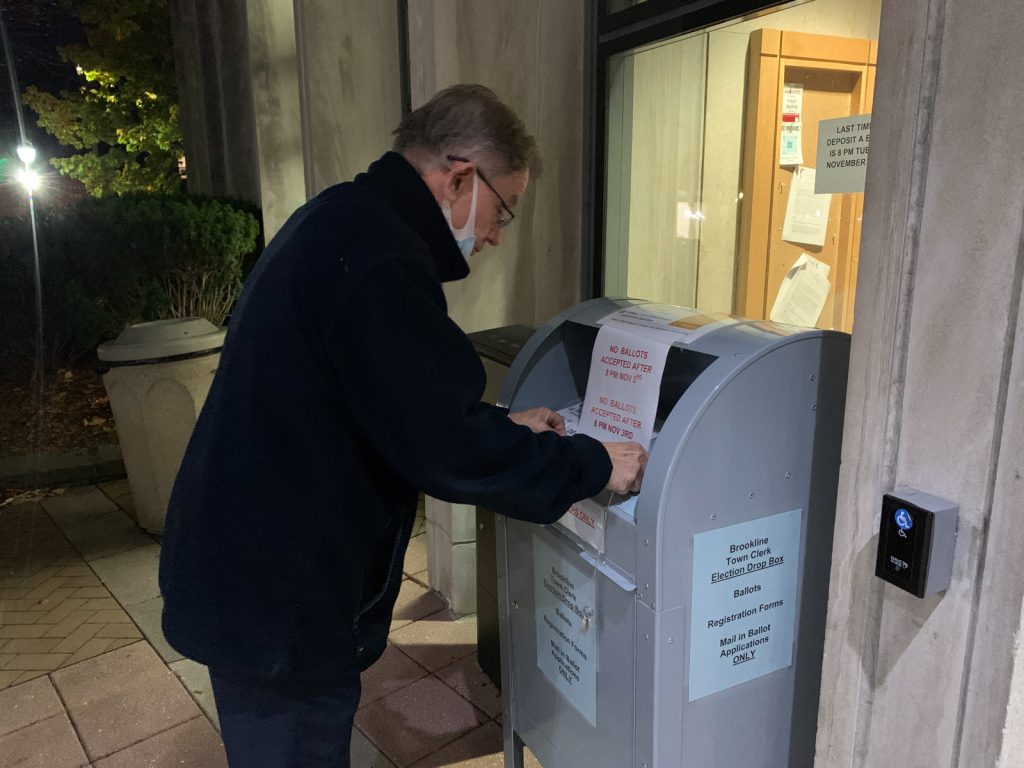
There are still a slew of tasks left to be done at the Town Clerk’s Office. Some workers are upstairs counting approximately 700 votes sent in from Brookline citizens in foreign countries, while others are set to return to Town Hall with the counting machines once attached to the town’s ballot boxes. The results will be derived from their memory cards, and posted online late into the night.
By the end of election day in Brookline, 30,076 votes were counted. Of those votes, only 6,199 people voted in-person the day of.
These unofficial results, which overwhelmingly chose the Democratic ticket for president, will be added on to the following Monday. However, for all intents and purposes, Brookline’s election day is over.
And while what Nutting called “America’s anxiety day,” ended with neither presidential candidate being able to confidently declare victory, the town of Brookline had more than done its part.
* * *
At 8 p.m., nearly 15 hours after he arrived at Town Hall, Nutting goes out to the drop box one last time. However, instead of collecting ballots, he tapes a sheet of paper onto it stating that no more are to be accepted.
“That’s it,” he says. A hint of pride can be heard in his voice.
The polls across the town of Brookline are officially closed.

